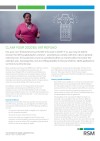Has your non-EU business incurred VAT in Europe in 2020? If so, you may be able to recover the VAT by applying for a refund — provided you comply with the rules. In general, claims by non-EU businesses must be submitted within six months after the end of the calendar year. Consequently, the strict filing deadline is 30 June 2021 for 2020 applications so there is no time to lose.
Most multinational enterprises (MNEs) incur VAT in countries where they are not established. A business may, for example, incur foreign VAT on trade fairs and conferences, meals and accommodation, travel, transportation and fuel costs, business entertainment, marketing and advertising costs, professional service, telecommunications, printing materials and stationery and training. Even for large business expenses, recovering foreign VAT may be an issue.
According to a survey of the Organization for Economic Cooperation and Development (OECD) over 80% of businesses incur more than USD 10,000 of VAT on foreign business expenditure every year. Yet, half of such businesses recover 50% or less of this foreign VAT — even when they are entitled to recover it all.
General conditions
Although each member state has specific rules concerning the VAT refund, generally, you are eligible for EU VAT refunds on business related expenses and if the following conditions are met:
- You are not registered, liable or eligible to be registered for VAT purposes in the EU.
- You have no place of business in the EU.
- You do not make any supplies in the EU (other than transport services related to the international carriage of goods, or services where VAT is payable by the person in the EU to whom the supply is made).
The deadline for annual claims is generally 30 June of the year following the calendar year when the expenses were incurred. This means that for 2020 (invoices dated 1 January to 31 December 2020) the deadline for submission is 30 June 2021.
Country specific conditions
- Not all VAT is permissible for a refund. For example in the Netherlands, it is not possible to claim VAT on invoices for restaurant expenses or VAT on costs incurred for VAT exempt activities. These requirements differ per country.
- Some countries demand a reciprocity agreement is in place in order to claim a VAT refund. The Netherlands has not implemented such an agreement.
- The deadline of 30 June 2021 for filing the claim is in principle a strict deadline. This can however differ per country. In the Netherlands for example, the deadline is not as harsh as in other EU member states due to the fact that claims filed after 30 June 2021 will still be processed if it relates to VAT incurred within the period dating back five years. Please note that, although these claims will be processed, it is however no longer possible to appeal the decision in court if the claim is made after the formal deadline as this is subject to the discretion of the responsible officer of the Tax Authorities. For instance, a claim for VAT incurred in the year 2016 can still be recovered ultimately 31 December 2021 subject to the discretion of the responsible officer. In other countries a claim might get declined immediately.
- In some countries, including the Netherlands, you need to provide the Tax Authorities with a ‘declaration of entrepreneurship’ in order to prove you are actually a company in the country in which you are registered. In addition, you might have to register as a foreign entrepreneur in the country in which you claim the VAT refund in order to be eligible.
- The EU VAT Directive has given a threshold which should be reached in order to be eligible to claim a VAT refund. The threshold amounts to a minimum of € 50 per calendar year or € 400 if filed per quarter. This threshold varies per country.
Original invoices
Another requirement is that the claim must be supported by an original VAT invoice of each expense. In some countries, PDF copies or other copies are not acceptable.
Electronic invoices
Most EU Member States allow electronic invoices. But not every electronic invoice is considered to be valid for VAT purposes. Most countries require that an electronic invoice contains an advanced electronic signature. In the past, considerable VAT reclaim opportunities were lost because the electronic invoices submitted did not comply with the rules of the relevant Member State.
What to do?
If your business incurred VAT on business expenditures in the EU, Switzerland or Norway in 2020, you should begin identifying this VAT, the underlying invoices and other documentation you will need to make a claim. This process is likely to be time-consuming, so the sooner you start the better.
We can help you claim your VAT refund in a cost efficient manner. Please contact your trusted RSM advisor.
Download 'Claim your 2020 EU VAT refund' in pdf

